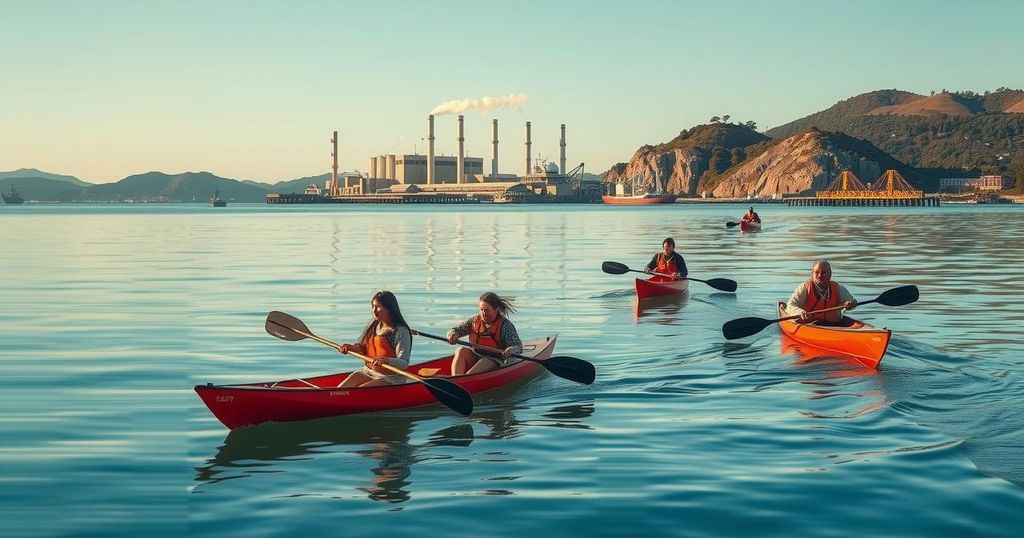In a move following the protests from Indigenous leaders from Ecuador, California’s Senate has introduced a resolution to investigate the state’s involvement in importing crude oil from the Amazon. Their visits to California highlight the environmental threats faced by these communities due to oil exploitation in their territories, particularly within Yasuni National Park. The resolution is poised for discussion soon, aiming to promote Indigenous rights while reassessing California’s oil dependency.
RICHMOND, California (AP) — A visible oil tanker at Chevron’s Richmond refinery underscores a troubling connection between California’s demand for Amazon crude and Ecuador’s deep rainforests. Indigenous leaders, bundled against the chilly Bay winds, kayaked through the waters on June 19, 2025, to shed light on the expansion of oil production that threatens their ancestral lands. Their visit prompted California’s state Senate to introduce a significant resolution urging further examination of the state’s role in importing crude from the Amazon. This move comes as Ecuador prepares to auction off 14 new oil blocks covering over two million hectares of rainforest, much of which belongs to Indigenous communities.
The delegation’s gathering coincides with the recent auctions in Brazil, which threatens its own sections of the Amazon. Despite local protests from environmentalists and Indigenous peoples, Brazil has pushed forward with plans to exploit oil resources. In Ecuador, however, Indigenous groups argue these plans contradict public sentiment solidified in a national referendum where citizens voted to keep oil underground in Yasuni National Park, a critically important ecological site.
Juan Bay, the president of the Waorani community, expressed that their presence in California was essential in raising awareness. He called for Californians to reconsider the implications of sourcing crude from their territories. The delegation joined locals in kayaking near the Chevron site, sharing personal narratives about their environmental struggles and the urgent threats to their homes. Meanwhile, for Nadino Calapucha of the Kichwa Pakkiru, the trip felt surreal, as if nature itself was validating their cause.
The connection between the Amazon and the West Coast seemed palpable during their kayak trip. Bay noted a ruling by the Inter-American Court of Human Rights that condemned the Ecuadorian government for infringing on Indigenous rights through oil operations in sacred areas. This legal framework compels authorities to cease drilling in certain zones and respect the referendum prohibiting extraction in Yasuni, home to billions of dollars worth of crude reserves.
As Amazon Watch prepared to release a report highlighting the ecological and human rights risks associated with oil extraction in Indigenous territories, California State Senator Josh Becker praised the visiting leaders for their dedication. He emphasized that these communities are at the forefront of the fight against oil extraction, defending their rights while protecting the integrity of the rainforest. Environmental advocates have long identified California as a significant player in Amazon oil consumption, with local companies processing millions of barrels of crude every year, leading to persistent pollution and health issues.
Kevin Koenig, Amazon Watch’s climate and energy director, reinforced that California’s dependency on Amazon crude has broader impacts, extending beyond geographical boundaries. He urged the Golden State to recognize its share of responsibility in perpetuating demand for oil from vulnerable areas. Koenig made it clear that California’s approach to climate leadership must address its reliance on crude linked to deforestation and human rights violations. He warned of the destructive cycle this dependency fuels, exacerbating California’s vulnerability to environmental disasters such as droughts and wildfires.
The resolution anticipated a vote within weeks signifies a potential pivot for California. It highlights the state’s urgent need to investigate the impact of its oil consumption on deforestation and cultural loss across Latin America. The outcome could pave the way for significant policies aimed at reforming how California engages with oil producers in the Amazon.
The situation in California reflects broader issues regarding Indigenous rights and environmental protections, linking the state’s energy consumption directly to the exploitation of resources in the Amazon. With Indigenous leaders calling attention to the ramifications of oil imports, California is being urged to re-evaluate its role and responsibilities. The hopeful passage of the Senate resolution marks a critical step towards accountability and a more sustainable energy strategy for the state.
Original Source: apnews.com






